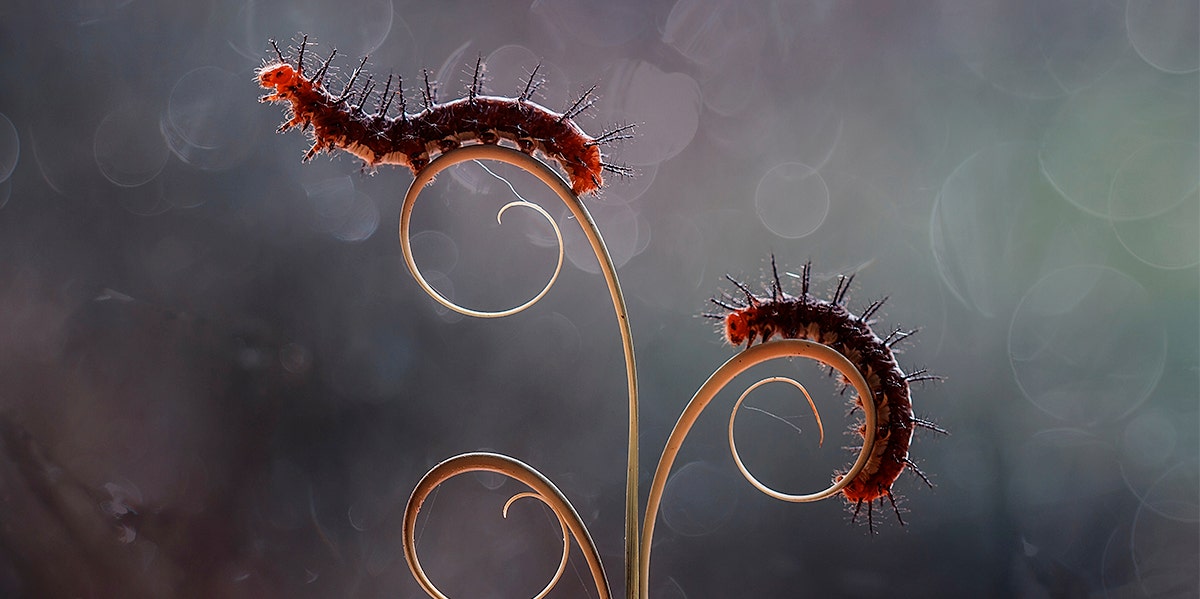What A Scientific Study With Cannibal Caterpillars Says About The Benefits Of Having A Sibling
What do caterpillars that eat each other say about siblings and our mental health?
 Abdul Gapur Dayak / Shutterstock
Abdul Gapur Dayak / Shutterstock As much as everyone needs their space and alone time, researchers found that having siblings and being forced to interact more with others leads to less selfish behavior. This is true, even for caterpillars.
Volker Rudolf was part of a research team that found that Indian meal moth caterpillars grew to become cannibalistic if they had more space in their habitat. When their personal space was decreased and they were forced to interact, especially with sibling caterpillars, they grew to become selfless.
How does this translate to humans and those with siblings? Do all living things such as birds and insects make our lives better, even without us knowing, simply because they're always around us?
Rudolf and his team’s research results about the benefits of having a sibling
Rudolf and his longtime colleague, Mike Boots, teamed up with other researchers and sought out to demonstrate how cannibalism can change through evolution in Indian meal moth caterpillars by manipulating their habitat.
These insects, also known as weevil moths and pantry moths, are common bugs found in kitchens and in products throughout the house. You'll often see them in packaged food products such as cereal.
Rudolf, a biologist from Rice University, found through laboratory experiments that cannibalism rates varied when the distance in the insects' habitat was increased or decreased. His results state that an increase in local interactions also increases selflessness between the larvae.
"At one end of the continuum are altruistic behaviors, where an individual may be giving up its chance to survive or reproduce to increase reproduction of others," Rudolf said. "Cannibalism is at the other extreme. An individual increases its own survival and reproduction by literally consuming its own kind."
The link for Rudolf and Boots to humans emerged when they identified the connection of the larvae with their own siblings. Increased interaction meant that the caterpillars would become more involved with their siblings and that was what they saw as the key factor in changing the cannibalism situation.
"In societies or cultures that live in big family groups among close relatives, for example, you might expect to see less selfish behavior, on average, than in societies or cultures where people are more isolated from their families and more likely to be surrounded by strangers because they have to move often for jobs or other reasons," Rudolf said.
In terms of future change, the decrease in cannibalism means that the population of these moths will increase with more offspring being produced by each one.
"If you're really good at recognizing kin, that limits the cost of cannibalism," Rudolf said. "If you recognize kin and avoid eating them, you can afford to be a lot more cannibalistic in a mixed population, which can have evolutionary benefits."
How does more interaction with siblings lead to a better life?
In the study, the researchers found that as the caterpillars interacted more with their siblings over time, the selfish behavior decreased within 10 generations.
The study uses Indian meal moths as their subjects, but what does this mean for humans?
It’s no secret that you’re forced to interact with your family and siblings if you all live under one roof. It’s the same for these moths. The siblings that are interacting together, whether it’s humans or worms, have to get used to being with one another by necessity. They both learn to share, eat together and survive.
Is being surrounded by other living things leading to a more happy life? How does this compare to those who are in constant isolation as many were during the pandemic?
According to a study done by Science Daily, being around other organisms is the key to a happier life.
“[T]he happiest Europeans are those who can experience numerous different bird species in their daily life, or who live in near-natural surroundings that are home to many species," said Joel Methorst, a doctoral researcher at the Senckenberg Biodiversity and Climate Research Centre.
Studies have also shown that many people are now more involved with nature as it’s a way to reconnect with the world after being isolated at home for such a prolonged period. In the same way that people with siblings are doing better alone, animals and nature provide a connection that those with siblings may lack.
Siblings are more important to our mental health than we think
Like the Indian meal moth caterpillars, humans thrive better when interacting with each other and being around siblings. It’s interesting to think about the different extremes that the meal moths might face.
On one side of the spectrum, the meal moths become so selfish they cannibalize each other when they're farther apart. When the space between them is decreased, they are selfless and sometimes sacrifice themselves for each other. Interacting with their siblings creates an environment where the whole species can thrive.
The point of the story is to appreciate your siblings because they make you happier, whether you know it or not, and to also appreciate that we aren’t Indian meal moths and we aren’t running around eating each other, most of the time.
Tomás Diniz Santos is a writer living in Orlando, Florida. He covers news, entertainment, and pop-culture topics.
